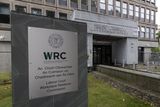Irish scientists in breakthrough to protect phones from superbugs
Stock image
Smartphones, door handles and even stair rails in hospital will no longer be breeding grounds for superbugs and germs thanks to Irish scientists.
They have discovered a way to stop common items we touch from becoming riddled with harmful bugs, some of which may be potentially lethal.
The team from the Institute of Technology in Sligo created a formula for a water-based solution that can be mixed in during the manufacturing process to kill or stop the growth of these bugs.
It even works on toilet seats, fridges, microwaves, TV remote controls and floor tiles, said Prof Suresh C Pillai, who led the team of researchers.
It has the potential for preventing people from picking up superbugs such as MRSA that can enter the bloodstream and lead to a life-threatening infection or the E. coli bacteria that results in food poisoning.
"It's absolutely wonderful to finally be at this stage. This breakthrough will change the whole fight against superbugs. It can effectively control the spread of bacteria," said Prof Pillai.
"Every single person has a sea of bacteria on their hands. The mobile phone is the most contaminated personal item that we can have. Bacteria grows on the phone and can live there for up to five months.
"As it is contaminated with proteins from saliva and from the hand, it's fertile land for bacteria and has been shown to carry 30 times more bacteria than a toilet seat."
He said other common uses could be found in stopping glass in public buses and trains, sneeze guards, deli counters and clean rooms in medical clinics from harbouring germs.
The findings, which have been published in the international scientific journal 'Scientific Reports', have sparked global interest.
The team used nanotechnology to formulate the effective antimicrobial solution which could become part of the manufacturing process.
Prof Pillai started the research 12 years ago, beginning at CREST (Centre for Research in Engineering Surface Technology) in Dublin Institute of Technology and then at IT Sligo's Nanotechnology Research Group (PEM Centre).
It also involved researchers in the University of Surrey in the UK.
The benefit of the discovery is that it gets around the inability currently to kill antibiotic superbugs once they have attached to a surface, increasing the risks of spread.
By building the new solution into the products, the protection is already in place.
He said: "The challenge was the preparation of a solution that was activated by indoor light rather than UV light and we have now done that.
Sprayed
"The new water-based solution can be sprayed onto any glass, ceramic or metallic surface during the production process, rendering the surface 99.9pc resistant to superbugs like MRSA, E coli and other fungi."
The research has been funded for the past eight years by John Browne, founder and chief executive of Kastus Technologies, who plans to bring the product to a global market.
Mr Browne was also supported by a significant investment from Enterprise Ireland.
"I was sold on this from the first moment I heard about it. It's been a long road to here but it was such a compelling story that it was hard to walk away from so I had to see it through to the end," said Mr Browne.
"This is a game changer. The uniqueness of antimicrobial surface treatment means that the applications for it in the real world are endless.
"The multinational glass manufacturers we are in negotiations with to sell the product to have been searching for years to come up with such a solution but have failed."
The next step is to adapt the solution for use in plastics and paint, extending its use to a wider range of material.
Join the Irish Independent WhatsApp channel
Stay up to date with all the latest news















